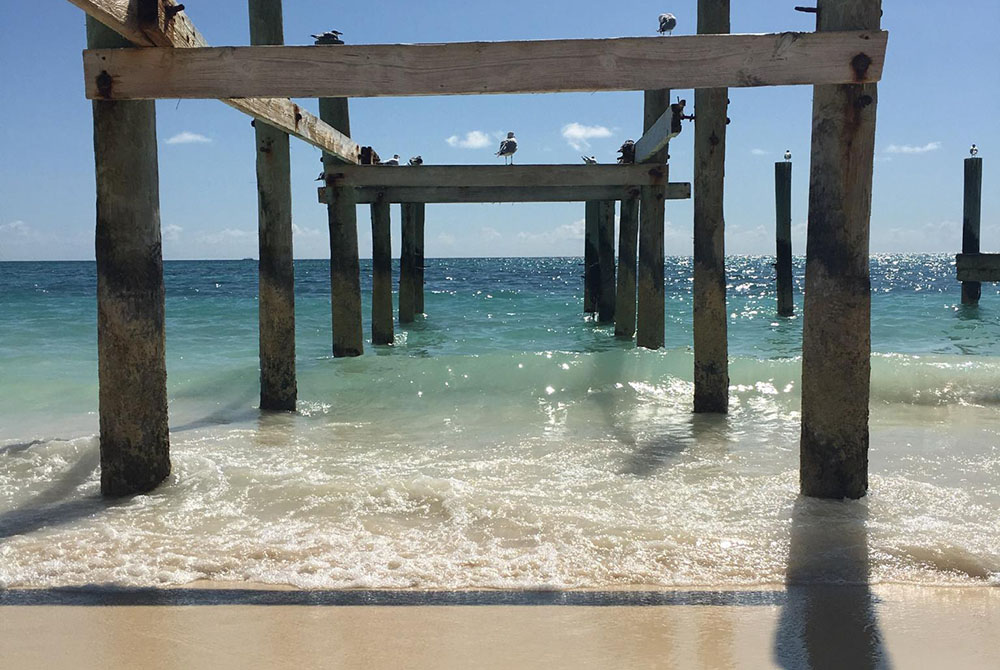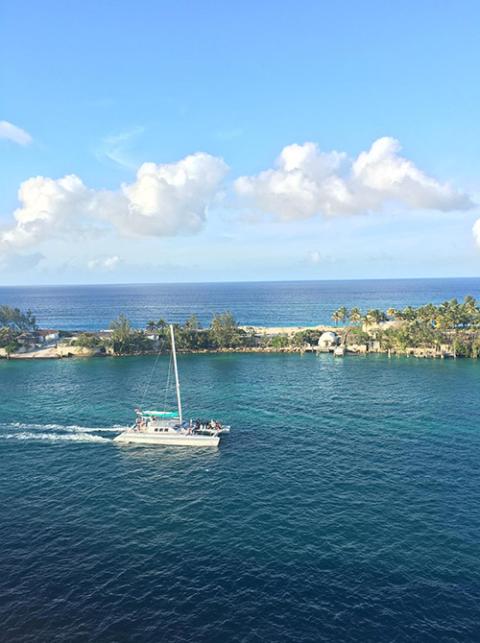
A peaceful day at the beach in Nassau, Bahamas, last year (Maria Longo)
Editor's note: Notes from the Field includes reports from young people volunteering in ministries of Catholic sisters. A partnership with Catholic Volunteer Network, the project began in the summer of 2015. This is our 11th round of bloggers: Celine Reinoso is a Loretto Volunteer in El Paso, Texas, and Maria Longo is a Notre Dame AmeriCorps volunteer in the Bronx, New York.
To me, one of the most difficult effects of the coronavirus pandemic is lack of accountability. This comes in many different forms.
There is lack of accountability when people are forced to work and study from home. In this, we lose our usual social and cultural standards. Because we are not as "seen" as we normally are, we run the risk of not living by the structures we typically would.
Within the confines of our own homes, we have more freedom to choose when and how we do things, but with this also comes the potential breakdown of schedules built to positively affect our lifestyles.
Not only are we less visible in the flesh, we are also limited in terms of communication. There is a risk of reaching out less frequently to friends, family, classmates or coworkers because of inconvenience or busywork. Lack of contact with other individuals we might normally function with and around increases the risk of shifting outside of our usual range of activity. Because of the pandemic, many small businesses, workspaces, community centers and places of worship have been closed to prevent the spread of the virus.
Aside from the reduction of tête-à-tête interaction, unenforced sociocultural norms and the breakdown of our normal schedules, the sacraments are also more difficult to access. With the decreased availability of public or shared spaces also comes the decreased availability of places to pray. This, coupled with the stressors that illness, death and lack of work can bring, could also potentially drive a wedge between us and the Lord.

A beautiful day, like the interior of a peaceful heart, in Nassau, Bahamas, last year (Maria Longo)
I have heard it said that no man is an island. I believe this is true. We are communal beings created for union with another. It is an unfortunate fact that we are unable to interact with each other in the way we normally would or with the frequency we normally would.
I have witnessed the results in my own experiences. Several times, I have caught myself sitting down at my computer and starting my workday in my pajamas. It took me multiple tries to nail down an appropriate schedule of work and prayer that also allotted time spent with my family or reaching out to friends.
So much of my environment and functions have changed. I am no longer able to live among the people I serve in the South Bronx in New York City. Instead, I must work through my computer and phone from my family home in Georgia. I am no longer able to attend daily Mass or pray holy hours in the local sanctuary as I did before. Instead, I watch live feeds of the Mass and pray set prayers during brief breaks throughout the day. While I pray I will be able to receive the Eucharist and reunite with those I hold dear soon, two matters have come to my attention.
First, I have noticed once more the importance of our physical nature as humans. It is true that we can easily abuse our bodies or the rest of creation. However, we are tactile beings. We give and receive information through the physical world. The physical limitations put upon us because of the coronavirus only shows our need for union within the mystical body of Christ.
Second, given our present isolation, I think there is also a great emphasis on our interior disposition. So much of rolling out of bed and getting through the day comes from set mentality. If I give into negative dialogue with myself, I run the risk of destroying my motivation to strive for excellence. I decrease my will to complete my daily duties and prayers or take a few minutes to check in on someone, to let them know I am thinking of them and loving them and praying for them.
If God is not the center of what I am doing and thinking, I quickly become the center of what I am doing and thinking, at which point everything starts to crumble. It is this moment of trial that the Lord has been preparing me for in the past few weeks or months or years. What is needed now is to fall into his embrace and trust his permissive will, taking confidence in the fact that he allows bad things to happen so a greater good might prevail.
While all I see is the swan gliding across the placid surface of the lake, God sees the entire picture. He sees the rapid movements of the swan's webbed feet, submerged and paddling. While all I see is the vast horizon of the ocean, God sees the many ecosystems and habitats that thrive along the shoreline, in the dunes, in the shallows, on the reef, in the depths.
Though I cannot see what the future holds — nor can I know the entirety of the past or present — worrying about what I cannot grasp or visualize will do me little good. Rather, I should open my heart and mind to the Lord, becoming as peaceful as the sunny day on the beach or the gentle wind filling sails. It is only with this inner disposition that I can hope to press forward with joy and charity.
[Maria Longo serves with the Notre Dame AmeriCorps program in the Bronx, New York. Because of COVID-19, she is currently working from her family home in Powder Springs, Georgia.]
Advertisement







